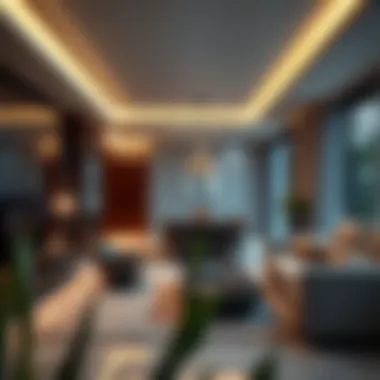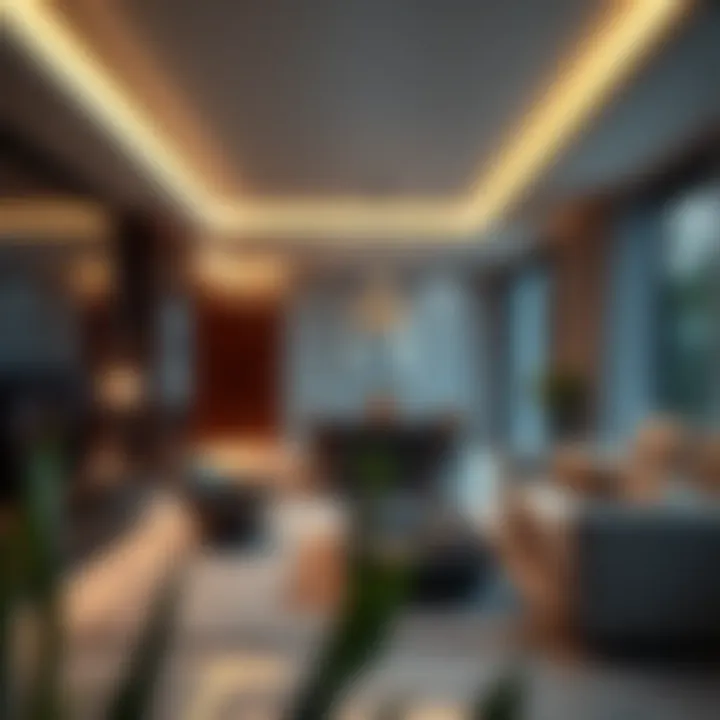Exploring Off-Plan Projects in Dubai: A Complete Guide


Intro
Dubai's skyline, a mesmerizing blend of modern architecture and cultural essence, continues to attract the attention of investors, homebuyers, and developers alike. Among the most intriguing options in the real estate market are off-plan projects—properties that are available for purchase before they are fully constructed. This segment is rapidly evolving, and understanding its nuances is essential for those looking to make a savvy investment.
As new off-plan projects emerge, they not only redefine the city's landscape but also create unique investment opportunities. To navigate this dynamic sector effectively, a deeper exploration of current trends, economic factors, and lifestyle features is paramount. This guide aims to equip you with the insights necessary to decipher the off-plan property market in Dubai, focusing on factors that affect property prices, emerging investment trends, and the lifestyle amenities that make living in these areas appealing.
Market Analysis
Current Trends in Investment Opportunities
Investment in off-plan properties is increasingly becoming a favored option for many due to the potential for appreciation before completion. These projects often present lower entry prices compared to finished properties, which can yield significant returns once the buildings are completed and operational. Some notable trends include:
- Sustainability Focus: There’s a growing demand for eco-friendly developments that emphasize green technology and materials. Projects like The Sustainable City are paving the way for future developments to consider environmental impacts.
- Enhanced Payment Plans: Developers are offering flexible payment plans, making it easier for buyers to invest without bearing the entire cost upfront. This approach has proven attractive, especially for first-time buyers.
- Technological Integration: Smart home technology is becoming standard in new builds, increasing their appeal. From home automation to sustainable energy solutions, the integration of technology in off-plan projects is a key selling point.
Impact of Economic Factors on Property Prices
Economic dynamics play a critical role in influencing property prices in Dubai. Factors such as fluctuations in oil prices, tourism growth, and governmental policies surrounding foreign investment can markedly affect the real estate landscape.
"Understanding these contextual variables is essential for anticipating market movements and investment viability."
- Oil Prices: As a significant portion of Dubai's economy is tied to oil revenue, shifts in the global oil market can impact buyer sentiment and investment levels.
- Tourism Trends: A robust tourism sector translates into greater demand for residential properties, especially in areas with high foot traffic.
- Regulatory Framework: Recent reforms, such as the introduction of long-term visas for investors and entrepreneurs, have bolstered confidence among foreign investors, inevitably affecting property prices and investment patterns.
Preface to Off-Plan Projects
When talking about the real estate market in Dubai, off-plan projects often come to the forefront of discussions. These properties, typically sold before they are completed, offer a unique opportunity for investors and homebuyers alike. Understanding this segment of the market is not just about grasping terminologies; it’s about recognizing the potential benefits as well as the complexities involved. Many find that diving into off-plan investments can feel like navigating a maze, filled with both promise and pitfalls.
This article aims to shed light on the significance of off-plan projects, elaborating on what sets them apart from traditional property investments. When looking into this topic, it becomes clear that the advantages of purchasing these properties range from financial to strategic benefits, making them an alluring choice for savvy investors.
Definition and Characteristics
So, what exactly are off-plan projects? In simple terms, these are real estate developments that are still under construction or in the planning phases when they are offered for sale. Buyers typically purchase these properties based on architectural designs and 3D models, often without seeing the physical structure.
Characteristics that define off-plan properties include:
- Flexible Payment Plans: Many developers offer enticing payment schemes that allow investors to pay in installments, easing the financial burden.
- Potential for Price Appreciation: Buying off-plan can often mean securing a property at a lower price before market values rise upon completion.
- Customizable Options: Some developers allow buyers to make choices regarding finishes and layout, leading to a sense of personalization.
"Investing in off-plan projects requires a leap of faith, but it can pay off well if timed right and if due diligence is performed."
Advantages of Investing Off-Plan
Investing in off-plan properties can present numerous advantages that appeal to different types of buyers. Consider the following benefits:
- Lower Entry Prices: Initial costs can be significantly lower compared to completed properties, making it easier for first-time buyers to enter the market.
- High Returns: With the Dubai real estate market’s historical upward trend, buyers stand to gain considerable profits if they choose to sell upon completion.
- Early Selection: When purchasing off-plan, investors often have the advantage of choosing prime units within a development—like a coveted corner apartment or a penthouse with views.
Current Off-Plan Market Overview
Understanding the current state of the off-plan market in Dubai is key for investors, homebuyers, agents, and developers alike. This overview connects the dots between market dynamics and individual investment opportunities. It sheds light on recent shifts, patterns, and the emerging competitive landscape that is reshaping urban development in this dynamic region. With bold plans for expansion and innovation, it's essential to grasp what’s happening in this field to make informed decisions.
Recent Market Trends
The market has seen a surge in interest recently, driven by several factors, including economic recovery, government initiatives, and rising population demand. Investors are holding onto properties before they hit the ground, taking advantage of pre-construction pricing. According to reports, off-plan sales rose significantly last year, indicating renewed confidence among buyers.
Some key trends influencing the market include:
- Increased buyer confidence: There's a positive shift in investor sentiment, likely due to the city's robust economic policies.
- Sustainability focus: Developers are embracing sustainable practices in construction, reflecting broader global trends.
- Rise of technology: Smart homes and innovative tech solutions are becoming standard features in developments.
This combination creates a vibrant ecosystem where potential buyers can find a variety of projects that not only suit their needs but can also assure a good return on investment.


Sector Analysis
The off-plan market in Dubai isn't a one-size-fits-all situation. It's a complex landscape divided among different sectors—each offering unique advantages and appeals.
Residential
Residential projects are the backbone of Dubai’s off-plan market. These developments typically address a growing demand for housing, catering to families, young professionals, and expatriates. One notable characteristic of residential projects is their variety, as they range from luxurious villas to affordable apartments.
Particularly appealing are the community-centric layouts that emphasize livability with amenities such as parks, schools, and retail spaces. This makes them a popular choice for first-time buyers and investors alike. The unique feature here is the blend of lifestyle enhancement with investment security, which is why many are drawn to these sectors despite the risks tied to pre-completion purchases.
Commercial
Commercial properties represent another crucial segment of the off-plan market. The demand for office spaces and retail developments has recently witnessed a resurgence, largely due to businesses expanding their footprints in Dubai. This market sector's characteristic is significant capital investment, often yielding high financial returns, making commercial off-plan projects a sought-after proposition.
Investors in commercial real estate generally experience better yields compared to residential properties. However, they also face longer periods of vacancy during economic downturns. A unique aspect to note is the increasing shift towards integrating workspaces with lifestyle areas, reflecting changing corporate priorities.
Mixed-use Developments
Mixed-use developments have gained traction in Dubai as they combine residential, commercial, and leisure components in one location. This sector contributes greatly to urban vibrancy, creating self-sufficient communities where people can live, work, and play—all in one spot.
The key characteristic of mixed-use developments is their flexibility, catering to the demands of diverse demographics. With amenities that appeal to various residents and businesses, they provide an attractive choice for investors looking for grounded projects with long-term potential. The downside might be the complexities in regulation and planning that comes with blending different types of spaces, yet the benefits significantly outweigh these challenges.
In summary, navigating the current off-plan market requires one to closely observe these trends and their implications. With the right information and approach, investors can successfully tap into Dubai's booming real estate landscape.
Key Players in Dubai's Off-Plan Sector
Understanding the key players in Dubai's off-plan sector is essential for anyone looking to navigate the complex world of real estate investment in the region. These players shape the market dynamics, influence trends, and ultimately determine the success of off-plan projects. When looking at this field, it becomes clear that knowing who is who and what they offer can be a game changer for savvy investors and homebuyers.
Leading Real Estate Developers
In Dubai, several developers have carved out a niche by launching ambitious off-plan projects that not only promise but often deliver on quality and innovation. Among these, Emaar Properties stands tall, known for landmark projects like the Burj Khalifa and Dubai Mall. Emaar has a reputation for setting high standards in luxury living, with their off-plan developments aimed particularly at wealthier investors. The allure of a property by Emaar often comes with excellent amenities, prime locations, and a proven track record.
Another titan in this space is DAMAC Properties, which is famed for its high-end residential and commercial projects. They often incorporate unique thematic concepts, as seen in their Akoya Oxygen project, blending nature with luxurious living seamlessly. This developer appeals to buyers looking for properties that offer a lifestyle rather than just a roof over their heads.
Meanwhile, Nakheel, which is the mastermind behind projects like The Palm Jumeirah, is noteworthy for its bold vision and commitment to creating iconic property setups. Their developments often enhance Dubai’s skyline while offering residents the chance to enjoy waterfront living – a feature that never fails to attract attention.
These developers form the backbone of Dubai's real estate market, making it crucial for investors to align themselves with such reputable names when considering off-plan investments. The reputation and reliability of these developers are key signals of the potential return on investment (ROI) that one should expect.
Emerging Investors and Stakeholders
Aside from established developers, the off-plan sector is also witnessing a rise in new and emerging investors, which adds another layer of excitement. These individuals or groups often come in with fresh perspectives, innovative ideas, and a willingness to take calculated risks. They might not yet have the illustrious track record of the big names, but their capacity to disrupt the market and introduce new concepts can indeed shift dynamics.
Small to medium-sized developers are increasingly stepping up, many targeting niche markets that the larger firms haven't fully tapped into. This can include affordable housing projects aimed at young families or eco-friendly developments that align with sustainable living trends. Dubai's expat community often drives these emerging groups to cater to specific demographics, ensuring that the product fits the market needs.
Investors are also gathering into joint ventures to pool resources and strengthen their bargaining power. This collaborative approach facilitates the sharing of risks and rewards, making it feasible for smaller investors to clinch projects they could not handle alone. Furthermore, crowdfunding platforms are becoming a more common vehicle for investment, allowing everyday individuals to invest in off-plan properties that once required a hefty degree of capital.
Lastly, stakeholders in the market, ranging from real estate agents to financial institutions, play a pivotal role in linking developers and buyers. Their insights into market trends can prove invaluable, presenting opportunities that may not be apparent at first glance.
By recognizing the key players in this sector, investors can strategically position themselves to leverage their influences, ultimately enhancing their chances of success in Dubai’s burgeoning off-plan market. Building relationships with these players can provide insights, tools, and opportunities that might otherwise fly under the radar, ensuring a more educated approach to investment decisions.
Notable New Off-Plan Projects in Dubai
Examining the latest off-plan projects in Dubai is crucial for understanding the current real estate landscape. These developments not only reflect shifting market dynamics but also influence urban expansion and resident lifestyles. Off-plan projects hold the promise of modern living standards, innovative designs, and, often, substantial returns on investment. By assessing these notable projects, investors and homebuyers can identify opportunities that align with their goals.
High-Profile Developments
Dubai is home to a multitude of high-profile off-plan projects that have garnered considerable attention. These projects typically come from well-established developers and promise luxurious amenities and prime locations. For instance, one of the most talked-about developments is the Dubai Creek Harbour, which has been designed to be a thriving community that combines residential, retail, and leisure spaces. This project is being positioned as a new cultural and commercial hub and showcases how the city continues to grow and transform.
Furthermore, the Dubai Marina area is seeing new towers being proposed, each boasting cutting-edge designs and waterfront views. Investors are particularly drawn to these high-profile developments due to their scalability and market potential. Properties in these areas tend to appreciate rapidly, making them alluring for both long-term and short-term investments.


Innovative Concepts and Designs
As buyers become more discerning, developers are shifting focus towards innovative concepts that fuse form and function. This includes integration of sustainable living and smart technologies.
Sustainable Living
The concept of sustainable living has gained traction in Dubai's real estate sector, driven by both consumer preference and regulatory incentives. Sustainable living refers to the design and construction of buildings that minimize their environmental impact while maximizing energy efficiency. Projects like The Sustainable City serve as exemplary models, emphasizing green architecture, water conservation, and the use of renewable resources. The key characteristic here is the holistic approach where living spaces are integrated with nature.
Why choose sustainable living? Because it promotes a healthier lifestyle and often leads to lower operating costs for residents. A unique feature of these developments is the incorporation of biodegradable materials and state-of-the-art waste recycling facilities. Although there might be higher upfront costs associated with such projects, the long-term benefits often outweigh these initial investments, making them increasingly popular among eco-conscious buyers.
Smart Technologies
On the other hand, smart technologies are reshaping how we view modern living spaces. This involves integrating advanced technologies into everyday living. Properties equipped with smart home systems can significantly enhance convenience and security. For instance, many new off-plan developments are being designed with filtering air systems, automated climate controls, and energy management systems that respond to user habits.
The critical characteristic of smart technologies is their ability to provide a seamless living experience, which appeals widely to tech-savvy homeowners. One outstanding feature is the capacity for remote monitoring, allowing residents to manage their homes from anywhere via mobile apps. The advantages of such integration are manifold—energy efficiency, increased property values, and enhanced lifestyle convenience.
In sum, both sustainable living and smart technologies are reshaping Dubai’s real estate future, offering promising alternatives for prospective buyers and investors alike.
“Investors looking into these innovative off-plan projects stand to gain not only in terms of financial returns but also in contributing to a more sustainable and responsive urban environment.”
Investment Insights
When it comes to understanding off-plan projects in Dubai, investment insights hold a vital role. Knowing the potential of a property often translates into significant financial gains. The off-plan market is particularly appealing for various reasons, with aspects like pricing trends, return on investment (ROI), and comparative property analysis coming into play. Grasping these insights not only prepares buyers for the market but also places them ahead of the competition.
Evaluating Investment Potential
Evaluating the investment potential of an off-plan property requires a discerning eye. It’s not just about the initial price tag but rather the assessment of future value appreciation. One must consider several critical factors:
- Location: Proximity to vital amenities such as schools, hospitals, and transport can greatly influence future property value. An area that’s set for infrastructural developments or revitalization can offer desirable returns.
- Market Demand: Understanding the demand dynamics is key. It can be useful to analyze both current interest levels and future projections. High demand often leads to better resale value.
- Quality of the Developer: Not all developers are equal. Backing a reputable developer can reduce the risks associated with delays or poor craftsmanship.
- Market Trends: Keeping an eye on economic indicators, such as tourism rates and population growth, can provide insight into the property's future value trajectory.
In summary, evaluating investment potential is about digging deeper than surface-level metrics. Buyers should engage with real estate professionals, conduct thorough research, and utilize market data to inform decisions.
Financing Options for Buyers
When diving into off-plan investments, understanding the financing options available is crucial. Many buyers may think they can only rely on cash payments, but that's far from the truth. Several alternatives can help lighten the financial load:
- Bank Mortgages: Many banks offer loans specifically tailored for off-plan purchases. Prospective buyers should shop around for competitive rates and favorable terms, as these can vary.
- Developer Payment Plans: Numerous developers provide staged payment plans, allowing buyers to spread the cost over time. This can align better with cash flow and can reduce the upfront burden.
- Government Incentives: Eventually, it's worthwhile to look into any government-backed schemes encouraging investment in the real estate market. Knowledge of these options can mitigate costs significantly for first-time investors.
- Crowdfunding Options: Though relatively new, real estate crowdfunding platforms allow smaller investors to pool resources. This method can offer access to high-value projects that would otherwise be out of reach.
Keeping abreast of these financing opportunities not only makes investing in off-plan properties accessible but also places buyers in a favorable position to optimize their investment strategy. Making informed financial decisions plays a pivotal role in the journey of real estate investment.
Legal Considerations
Investing in off-plan projects in Dubai is akin to walking a tightrope; it offers potential rewards, but also lurking risks. Thus, understanding the legal framework surrounding off-plan purchases isn’t just a good idea—it’s essential. When financing property that doesn't physically exist yet, it’s crucial to have a grasp on the regulations and contractual obligations that protect both buyers and developers.
Regulatory Framework
The legal landscape in Dubai is structured to safeguard investments while enabling developers to bring innovative projects to fruition. The Real Estate Regulatory Agency (RERA), established under the umbrella of the Dubai Land Department, plays a pivotal role in maintaining transparency and fostering trust within the real estate market.
- Registration Requirements: Developers must register all off-plan projects with RERA before selling. This ensures that buyers know the project is legitimate and compliant with local laws.
- Escrow Accounts: To protect buyers' funds, developers are required to open escrow accounts with a bank. This stipulation means that your money is utilized for project development only, reducing the risk of misappropriation.
- Sales and Purchase Agreements (SPAs): An SPA outlines the terms and conditions of the transaction. It’s vital that buyers scrutinize this document thoroughly to understand their rights and responsibilities. This includes clauses on payment schedules, delivery timelines, and consequences for defaults.
By understanding these regulatory pieces, investors can proceed with greater confidence, knowing they are working within a framework designed to ensure fairness and accountability.
Documentation Requirements
Navigating through paperwork when investing in off-plan projects can be daunting. Nevertheless, having the right documents lined up can smoothen the process significantly.
- Identity Proof and KYC Documents: Just like buying a car, you’ll need to provide identification and proof of income. This usually includes a passport, Emirates ID, and bank statements to comply with Know Your Customer (KYC) regulations.
- Sales & Purchase Agreement: As mentioned earlier, this is a key document that stipulates all terms of the property purchase. Ensure you get a copy, and it’s wise to keep it stored safely.
- Payment Receipts and Instalment Records: Keep all receipts of payments made, as they’ll be helpful if disputes arise in the future.
- Developer’s License: Verify if the developer holds a valid license, which can usually be obtained from the developer or RERA’s database.
Challenges and Risks


Investing in off-plan projects in Dubai, while full of potential rewards, comes with its share of challenges and risks that investors need to be keenly aware of. The fast-paced nature of the market often leads to unforeseen circumstances. Understanding these aspects helps buyers and stakeholders make educated decisions.
Market Volatility
Market volatility can significantly impact the overall success of an investment in off-plan projects. Prices can swing widely based on factors such as economic conditions, governmental regulations, and global events. For example, if there’s a sudden downturn in oil prices— which is a crucial driver for the UAE economy— it could lead to a decrease in buyer interest. Additionally, if developers face challenges like shortages in construction materials due to trade slowdowns, it can throw timelines and budgets into chaos.
Potential investors must monitor market trends relentlessly. Data analytics can serve as an invaluable tool here. Resources like Statista can provide insights into housing demand, price trends, and demographic shifts that are vital for assessing investment viability. Furthermore, participating in local real estate forums on platforms such as Reddit can keep investors informed about grassroots feelings on current trends.
"Real estate’s a rollercoaster; understanding the dips and rises is key to not losing your lunch."
It’s also crucial to look beyond immediate market conditions, as long-term visibility is essential. Past performance doesn’t guarantee future results, but trends can sometimes point in the right direction. Buyers should take a measured approach, perhaps by diversifying their investments across different segments to cushion against potential downturns.
Construction Delays
Construction delays in off-plan projects can be a double-edged sword. On one hand, these delays may just extend the timeline of when an investor can expect an ROI; on the other hand, they can also lead to significant financial implications. If a project is expected to be completed in a year and instead takes two years, the associated carrying costs jump, and buyers find themselves waiting indefinitely.
Developers might face delays for various reasons, such as permitting issues, labor shortages, or even inclement weather. Investors need to pay attention to the developer's track record on time management. Are they known for completing projects on time, or have they faced multiple delays in the past?
Some might argue that construction delays can actually offer an advantage, providing time for the market to appreciate further before the property is delivered. Yet, the reality is more complex. Investors should consider incorporating clauses in the sales agreement that stipulate penalties for delays. This could provide a safety net for financial loss.
Lastly, regular communication with developers is essential. Transparency can often mitigate apprehensions about delays. If investors stay informed on project milestones, they can adjust their expectations accordingly, making it easier to navigate the complexities associated with off-plan developments.
Navigating these challenges will take diligence and a proactive approach, yet awareness of these risks is paramount for anyone looking to dive into Dubai’s burgeoning off-plan sector.
Future Outlook
The future outlook for off-plan projects in Dubai plays a significant role in understanding the real estate landscape. This sector is not merely about buildings and locations; it reflects the aspirations of investors and homebuyers, while also revealing the trends that shape urban development. Buyers need to consider not only the immediate benefits of investing off-plan but also how these projects might influence their long-term investment strategies.
Predictions for Market Growth
A variety of factors contribute to the anticipated growth of the off-plan market in Dubai. Firstly, the increasing influx of expatriates fuels demand for housing, and many are turning towards off-plan properties due to their affordability compared to completed ones. The following trends paint a promising picture:
- International Investments: Global investors are keen on Dubai due to its relatively stable political environment and robust economy. A return to stability post-pandemic has rekindled interest in this dynamic city.
- Regulatory Support: The government’s initiatives, including easier visa regulations and enhanced property laws, will continue to attract investment. New measures to facilitate foreign ownership in specific areas underscore the commitment to growth.
- Innovative Developments: Developers are embracing technology with smart homes and sustainable living, appealing to eco-conscious buyers and tech enthusiasts alike. These features might compel buyers to invest earlier in the building process.
By keeping a lookout on these trends, investors can position themselves to reap the benefits as the market continues expanding.
Potential Shifts in Consumer Behavior
As the off-plan market grows, it's crucial to acknowledge potential shifts in consumer behavior that may arise. The preferences of buyers are evolving, influenced by various societal and economic factors:
- Increased Focus on Sustainability: Modern consumers, especially younger generations, lean heavily towards sustainable living solutions. Developers who integrate eco-friendly practices into their projects may find significant interest.
- Tech Integration: Buyers are increasingly appreciating the role of technology not just in construction, but also in everyday living. Smart home features such as energy-efficient systems and integrated home automation have become selling points in new developments.
- Experience Over Ownership: There is a noticeable trend towards valuing experiences over mere property ownership. This might lead to developments that incorporate communal areas or amenities, creating a lifestyle rather than just providing a space.
These shifts will demand a nimble response from developers and stakeholders. Understanding consumers' changing priorities means adjusting marketing strategies and project designs to better align with what future buyers are looking for.
Ultimately, keeping an eye on these trends enhances the knowledge investors need to make informed decisions in this ever-evolving market.
For those interested in further insights into the dynamics of Dubai's real estate landscape, resources like Wikipedia and Britannica can be quite useful. Investors should also consider engaging with local communities on platforms such as Reddit and Facebook to stay updated.
Finale
In navigating the dynamic realm of off-plan projects, it's imperative to draw conclusions that encapsulate the insights gathered throughout the exploration of Dubai's real estate landscape. Understanding these elements allows investors, homebuyers, and stakeholders to make informed decisions that are pivotal in an ever-evolving market.
Summary of Key Points
- Investing Landscape: Off-plan projects present a unique opportunity for both seasoned investors and first-time buyers. The promise of higher returns, combined with the ability to tailor specifications through the construction phase, creates a compelling case for consideration.
- Market Trends: Recent trends indicate a marked shift towards sustainable and smart technologies in developments—a reflection of the growing demand for eco-conscious living as well as cutting-edge conveniences.
- Legal and Financial Navigations: It’s crucial for purchasers to familiarize themselves with the legal frameworks and documentation required for off-plan investments. Adequate knowledge mitigates risks and ensures a smoother transaction process.
- Challenges: It is also vital to acknowledge the challenges that come with investing off-plan, such as market volatility and potential construction delays. Awareness of these risks helps prepare investors for potential pitfalls, allowing them to strategize accordingly.
Final Thoughts on Investing Off-Plan
Off-plan projects can indeed be a lucrative avenue for investment, but they require a discerning approach. Considerations such as location, timing, and developer reputation are paramount in making a sound investment decision. The balance between risk and opportunity can sway with market fluctuations; thus maintaining a proactive stance is fundamental.
Engaging in continual research and leveraging expert consultations will serve investors well as they seek to navigate this complex territory. With a grounded understanding and proper preparation, opportunities abound within Dubai's off-plan market, ready for those willing to take the plunge.
Investing in off-plan projects is not merely a transaction; it's a step into the future of urban living, both challenging and rewarding.
In summary, while there are challenges, the potential rewards of investing wisely in off-plan projects in Dubai are significant. It's about weighing the right moves at the right time, setting the stage for what could very well be a lucrative venture.



